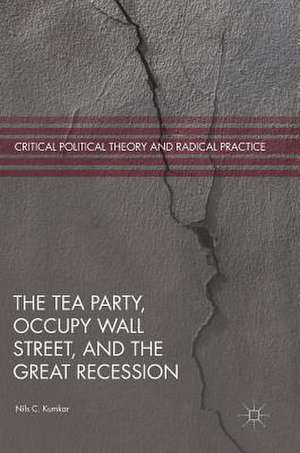The Tea Party, Occupy Wall Street, and the Great Recession: Critical Political Theory and Radical Practice
Autor Nils C. Kumkaren Limba Engleză Hardback – 3 apr 2018
| Toate formatele și edițiile | Preț | Express |
|---|---|---|
| Paperback (1) | 882.47 lei 6-8 săpt. | |
| Springer International Publishing – 26 ian 2019 | 882.47 lei 6-8 săpt. | |
| Hardback (1) | 892.07 lei 6-8 săpt. | |
| Springer International Publishing – 3 apr 2018 | 892.07 lei 6-8 săpt. |
Din seria Critical Political Theory and Radical Practice
-
 Preț: 148.22 lei
Preț: 148.22 lei -
 Preț: 179.49 lei
Preț: 179.49 lei - 9%
 Preț: 625.63 lei
Preț: 625.63 lei -
 Preț: 371.08 lei
Preț: 371.08 lei - 18%
 Preț: 724.80 lei
Preț: 724.80 lei - 15%
 Preț: 577.87 lei
Preț: 577.87 lei - 18%
 Preț: 778.76 lei
Preț: 778.76 lei - 18%
 Preț: 733.33 lei
Preț: 733.33 lei - 18%
 Preț: 789.83 lei
Preț: 789.83 lei - 18%
 Preț: 776.27 lei
Preț: 776.27 lei -
 Preț: 382.18 lei
Preț: 382.18 lei - 15%
 Preț: 527.79 lei
Preț: 527.79 lei - 15%
 Preț: 639.25 lei
Preț: 639.25 lei - 18%
 Preț: 782.24 lei
Preț: 782.24 lei -
 Preț: 198.19 lei
Preț: 198.19 lei - 18%
 Preț: 780.06 lei
Preț: 780.06 lei - 15%
 Preț: 576.85 lei
Preț: 576.85 lei -
 Preț: 381.43 lei
Preț: 381.43 lei - 15%
 Preț: 643.99 lei
Preț: 643.99 lei -
 Preț: 380.25 lei
Preț: 380.25 lei - 8%
 Preț: 495.96 lei
Preț: 495.96 lei - 15%
 Preț: 501.24 lei
Preț: 501.24 lei -
 Preț: 385.47 lei
Preț: 385.47 lei - 15%
 Preț: 526.18 lei
Preț: 526.18 lei - 18%
 Preț: 783.98 lei
Preț: 783.98 lei - 15%
 Preț: 643.99 lei
Preț: 643.99 lei - 15%
 Preț: 641.53 lei
Preț: 641.53 lei - 18%
 Preț: 945.14 lei
Preț: 945.14 lei
Preț: 892.07 lei
Preț vechi: 1087.88 lei
-18% Nou
Puncte Express: 1338
Preț estimativ în valută:
170.70€ • 178.82$ • 141.47£
170.70€ • 178.82$ • 141.47£
Carte tipărită la comandă
Livrare economică 08-22 aprilie
Preluare comenzi: 021 569.72.76
Specificații
ISBN-13: 9783319736877
ISBN-10: 3319736876
Pagini: 296
Ilustrații: XIII, 279 p. 26 illus., 1 illus. in color.
Dimensiuni: 148 x 210 mm
Greutate: 0.63 kg
Ediția:1st ed. 2018
Editura: Springer International Publishing
Colecția Palgrave Macmillan
Seria Critical Political Theory and Radical Practice
Locul publicării:Cham, Switzerland
ISBN-10: 3319736876
Pagini: 296
Ilustrații: XIII, 279 p. 26 illus., 1 illus. in color.
Dimensiuni: 148 x 210 mm
Greutate: 0.63 kg
Ediția:1st ed. 2018
Editura: Springer International Publishing
Colecția Palgrave Macmillan
Seria Critical Political Theory and Radical Practice
Locul publicării:Cham, Switzerland
Cuprins
1. Introduction: Protests in the Wake of the Great Recession.- 2. The Structural Crisis and the Emerging Patterns of Class Conflict.- 3. The Demographics of the Mobilized: the Core Constituency of the Protests.- 4. Theoretical and Methodological Considerations: Habitus and Habitus Reconstruction.- 5. Experiencing the Crisis: Results of the Habitus Reconstruction.- 6. Fields and Conjunctures: The Thick Opportunity Structure of the Mobilizations.- 7. The Acid Test: Reconstructing the Occupation of Urban Public Space as a Socially Determined Practice.- 8. Conclusion and Outlook.
Recenzii
“The Tea Party, Occupy Wall Street, and the Great Recession, is an ambitious and thought-provoking addition to this literature. … Kumkar’s conceptually synthetic and analytically meticulous work makes for a stimulating contribution to nonreductionist class analysis of contemporary movements. It helps us understand OWS and the Tea Party by reconstructing how ordinary citizens made sense of the nameless disruption of capitalist crisis with the instruments of class-specific moral categories, their myopias included.” (Linus Westheuser, Mobilization, Vol. 24 (4), November, 2019)
Notă biografică
Nils C. Kumkar is a postdoctoral research fellow at the SOCIUM, University of Bremen, Germany
Textul de pe ultima copertă
This book analyzes the Tea Party and Occupy Wall Street as symptoms of the structural crisis of US capitalism and its class structure. It shows that the protests have to be understood as rooted in the petty bourgeoisie’s lived experience of crisis, which also plays a crucial role in current political developments like the successful presidential campaign of Donald Trump. The book explains the Great Recession as an acute phase of the structural crisis of the finance-dominated accumulation regime, identifies the social classes from which the core-participants of the respective protests recruited themselves and the socioeconomic developments to which they were exposed in the years leading up to the protests, and interprets interviews and group discussions conducted with activists to reconstruct the habitus that structured both their experience of the crisis and their resonance with the respective protest practices. It thereby provides an encompassing understanding of the social logics notonly of these social movements, but of the current political conjuncture in the US.
Caracteristici
Based on the interpretation of (qualitative) interviews, focus-group discussions and participant observations conducted with activists from the two movements in the years 2012-2014 Refers to available surveys and statistics on the protest movements Of interest to scholars and students working on contemporary capitalism, dynamics of class-societies, and social movements on the right and left of the political spectrum
